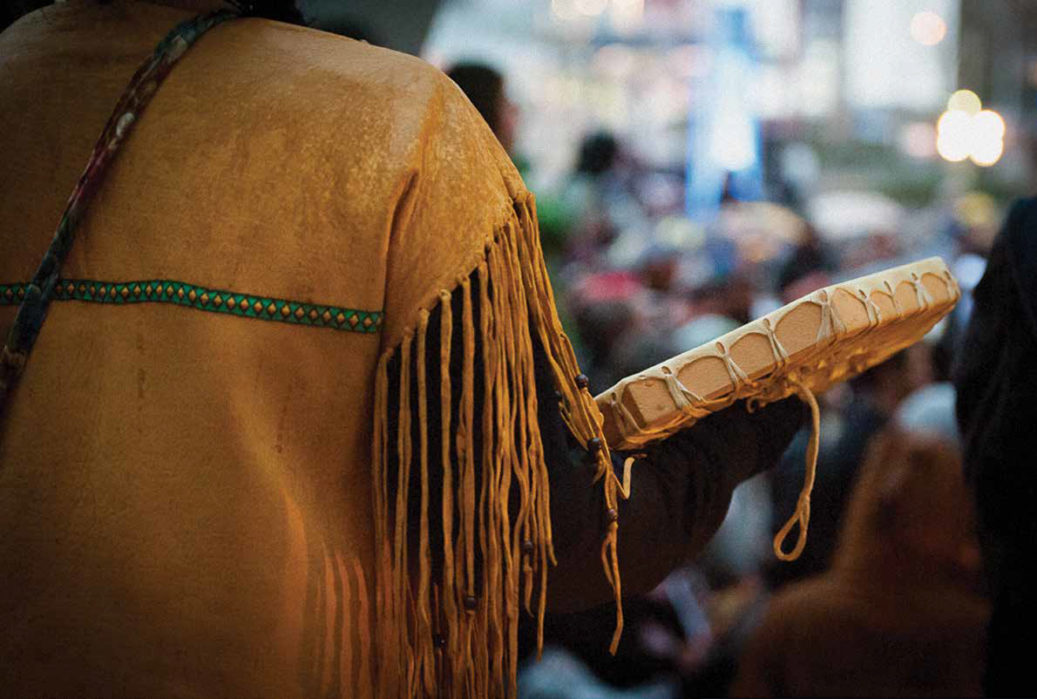Understanding injustice beyond popular portrayals
When flood waters swept across southern Alberta [in] June [2013], Dan Rossi was eager to help those affected. Still, Rossi, a committed Christian and member of the Calgary Police Service, asked God not to send him to Siksika Nation, a First Nations reserve located east of Calgary whose six communities were hit hard by the flooding.
“As a police officer, my views on First Nations people were very limited to the five per cent who are involved with drug and alcohol addiction,” Rossi says. “I think a lot of the information I’ve received about First Nations people came from colleagues … [who would use] derogatory terms. It wasn’t something I would repeat—just loving people the way I do, I wouldn’t reduce someone to a label of term—but I was frustrated with the addiction, the abuse and the entitlement I would see” working as a police officer.
While Rossi’s views have changed over the course of his work in Siksika, they are indicative of the way many Canadians—Christians included—view indigenous peoples, which includes First Nations, Inuit and Métis.
Terry LeBlanc believes that Christians are often very uneducated about indigenous peoples. Even when they are, that education is largely built on stereotypes perpetuated by the mainstream media.
“Media portrayals…don’t paint the whole picture,” says LeBlanc, a Mi’kmaq/Acadian who is currently the chair of the North American Institute for Indigenous Theological Studies. “People take snippets of news and information they have received and create a picture. Unfortunately for many Christians, that is a narrowly-framed picture that says, ‘All First Nations people are this way,’ when really, they aren’t.”
This narrow focus prevents Christians from understanding how indigenous peoples got to be where they are today. Many believe that enough work has been done to repair relationships with indigenous peoples, who are still affected by the deep impact of Canada’s residential school system.
“Many people believe, ‘If those [indigenous] folks just got over it and moved on, we’d all be okay,’” LeBlanc says.
The issues are more complex than that.
LeBlanc acknowledges that indigenous communities are plagued by a number of issues.
“These social ills wouldn’t be specifically different for First Nations peoples than the rest of Canadians, other than they appear more obvious given the focus media and government agencies tend to give First Nations, Inuit and Métis communities,” LeBlanc says. “We struggle with the same kinds of things that other Canadians struggle with.”
Those issues include family breakdown, violence, poverty, and health issues that range from common diseases related to aging, to more devastating illnesses like HIV and AIDS.
Indigenous communities also experience high rates of teen pregnancy, LeBlanc notes. The greater level of transience in relationships today means that children are being born to teenage and young adult women who do not have a committed spouse or partner who can help them raise their child.
LeBlanc says that indigenous peoples experience these social ills “in a far more extensive and intense way” due in large part to land treaties, made over the past 250 years, not being honoured.
Then there is the matter of residential schools, which, during their 150 years of operation, extricated First Nations, Inuit and Métis children from their families and attempted to assimilate them into the rest of society.
“Even though residential schools have not operated since the early to mid-1990s, they left many aboriginal families—if not most—with very fractured sets of family relationships and an increasing number of dysfunctional behaviour in child-rearing and management,” LeBlanc says.
Mark MacDonald, National Indigenous Anglican Bishop for the Anglican Church of Canada, believes that a sense of balance and wholeness needs to be restored to indigenous communities.
“There are issues of basic infrastructure, like water and housing, which are absolutely necessary [to address], but also, it’s important to remember that it was the policy of the government and many churches to disrupt indigenous communities and families,” MacDonald says. “On one level they thought indigenous people would die off soon, but on another level, they felt it was in the best interest of indigenous people to assimilate as quickly as they could into the broader population.”
Indigenous communities are trying to recover from these policies, MacDonald adds. People often use words like ‘self-determination’ and ‘sovereignty,’ but MacDonald recalls hearing one elder say that what self-determination means for indigenous peoples is that they become what God wants them to be: people who are healthy, whole and faithful.
“I don’t think that’s too far off from the agenda right now,” MacDonald says. “A lot of what [indigenous peoples are] about is being a good dad, being a good spouse, being a faithful person [and] living out the purpose that God intended.”
One of the biggest factors that many people, including Christians, get hung up on is the issue of leadership corruption among indigenous communities and governing bodies. While few would dispute the need for clean water and acceptable housing, reports of communities mishandling finances often lead to indifference among non-indigenous Canadians, who might ask “why should I help them if they can’t even help themselves?”
While such views may not be entirely unfounded, MacDonald is quick to point out, “there is great diversity from one place to another; it is difficult to characterize the whole by the grossly visible, as in Toronto right now—do all mayors smoke crack?” “Many First Nations leaders are unapologetically and boldly Christ centred,” he adds.
To better understand issues of leadership corruption, it’s important to recognize the historical factors that have played a part.
“We are seeing the results of generations of forced and relentless disruption…To now say, as so many do, that indigenous peoples are solely to blame for their corruption and difficulties is, as National Chief Shawn Atleo said, like ‘breaking someone’s leg and blaming them for limping.’”
So what can Christians do to help? Steve Heinrichs believes it is important for non-indigenous people to recognize their privilege, and that they are beneficiaries of a system that is unfair.
“We didn’t choose this way of being, but it’s what we inherited,” says Heinrichs, Director of Indigenous Relations for Mennonite Church Canada. “We need to redress the wrongs of the past because they’re still [going on]. …This is not abstraction for native communities. This is real life.”
Many people feel a sense of paralysis or guilt surrounding these topics, Heinrichs says. Educating oneself and building relationships with indigenous peoples are steps in the right direction.
He points to an essay by Leanne Simpson, a writer of Mississauga Nishnaabeg ancestry, titled “Liberated people, liberated lands.” In the essay—published in Buffalo Shout, Salmon Cry, a collection of writing on indigenous topics that Heinrichs edited—Simpson argues that the Canadian education system teaches children very little about indigenous peoples.
“I hope that Canadians take it upon themselves to learn a more faithful history of this place and to teach their children to recognize these injustices and to understand how they contribute to the colonial legacy,” Simpson writes.
“I hope that Canadians learn to acknowledge whose land they are living on, and to recognize how their presence on our land interrupts our ways of being in this world. I hope they take up the responsibility to prevent further intrusion into indigenous lives, and, if called upon, I hope they will lend their support to various expressions of Indigenous nationhood. Ultimately, choosing to resist the colonial system means making some costly choices in mind, spirit, and body—individually and collectively—as we begin to recognize that Canadians are living on top of someone else’s home, and as we try to work out the implications of that truth.”
LeBlanc agrees, saying he is surprised at how many people have not familiarized themselves with the information from the Truth and Reconciliation Commission of Canada, an initiative that seeks to inform all Canadians about the atrocities committed in the residential school system.
“It’s curious, because Christians should be concerned with truth—and certainly, given the gospels—concerned with reconciliation,” LeBlanc says. “Education beyond sound bites found in the media is key.”
MacDonald urges non-indigenous Christians to get to know their indigenous brothers and sisters. He notes that one of the most Christianized ethnic groups in Canada is indigenous peoples.
“I think people would be very pleasantly surprised at the level of fellowship that’s possible, and the level of spiritual commitment they will immediately see when they meet indigenous people,” MacDonald says. “For most indigenous people I know—even ones struggling with chemical dependency—the dearest thing to their heart is to be a good dad [or] be a good mom. I think they appreciate and enjoy fellowship—especially with Christian people.”
Getting to know indigenous peoples, and the education he has received from the relationships he has built, has certainly made a difference for Dan Rossi. By working alongside members of the Siksika Nation as they work to rebuild their flood-ravaged community, he has found a broader perspective on indigenous peoples.
He has gotten to know a people who are proud of their rich heritage—people who are willing to work at the problems and issues they are faced with.
“I’ve been extremely blessed to work with amazing people,” he says. “It really opened my eyes to the resiliency of the Siksika people and changed the exposure I had from policing.” LeBlanc cautions that solving the issues facing indigenous communities, and working toward reconciliation, requires patience.
“As a person involved in ministry 39 years, I know in mainstream Christianity…there’s a great deal of impatience,” he says.
These problems were not created overnight, and “we’re not going to get out of it overnight,” LeBlanc says.
MacDonald adds that he is encouraged by what he sees when it comes to communication between indigenous peoples and non-indigenous Christians.
“There is no situation in Canada that calls more urgently for reconciliation, and it’s not good that the church be silent on this issue,” he says. “The church should aggressively move forward to pursue an agenda of reconciliation.
“I think that’s really what our destiny in God is.”
About


